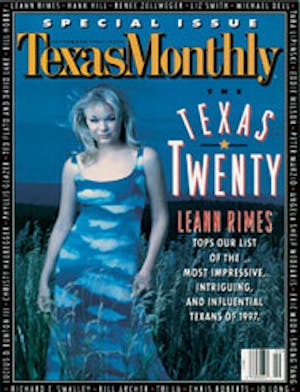AS A CHILD I LOVED to pretend I was the heroine in fairy tales,” says Angela Shelf Medearis. “The problem was, writers didn’t do black girls back then.” Medearis has helped rectify that situation by producing sixty books with black themes or charactersall in the past seven years. With some 1.5 million copies of her works in print, she is Texas’ most popular and successful author of children’s literature.
A native of Virginia, the chatty, charming Medearis moved to Austin in 1975 with her husband, Michael, a fellow writer and frequent collaborator. Now a grandmother who’s “over fortythat’s close enough,” she published her first book in 1990. The experience proved that her marketing savvy was as effective as her writing. Picking Peas for a Penny, a counting rhyme, had accumulated dozens of rejections before Medearis stopped by Austin’s State House Press and delivered an impromptu reading; a week later she had a contract. Medearis subsequently clinched her first cookbook sale by sending a peach cobbler to one New York editor, and she had to nag the staff of Scholastic until they accepted The Seven Days of Kwanzaa, a history of the African American holiday that has since sold 185,000 copies. Dancing With the Indians, a tale of a former slave among the Seminoles, was featured on the PBS series Reading Rainbow, and she has racked up kudos that include the first-ever Teddy, a children’s-book award presented by Laura Bush. In the summer of 1996 the governor and the first lady hosted a Juneteenth banquet to showcase Medearis’ original recipes.
Ever prolific, Medearis has two titles coming out in Octobera comical picture book, The Ghost of Sifty-Sifty Sam, and another cookbook, Ideas for Entertaining From the African-American Kitchen. Works in the works include a Creole Cinderella story, a biography of Southern journalist Ida B. Wells-Barnett, Medearis’ first teleplay, and an illustrated fable about jazz-playing cats (with monikers like Cab Calico and Thelonious Manx). Between writing stints she speaks all over the country. Many children send fan letters; her favorite reads: “Dear Mrs. Medearis, Thank you for telling us about being a writer. I love your stories. When I grow up, I want to be a waitress.”
Despite her success, Medearis still encounters prejudice. “Some white parents are hesitant to buy my books,” she says. “I always think, Why not? You buy books about bunnies with clothes and aardvarks with glasses.’ My books are just about human beings with a really good tan.” (She deplores black-themed books that are clearly the products of white authors. In one book about a young girl’s life, she found the sentence “Regina turned red.” Medearis instantly called up the editor and noted dryly, “You know, you don’t turn red when you’re the color of Regina.”) And some publishing houses question books about African Americans that focus on themes from everyday life instead of ethnic issues. One New York editor dismissed Poppa’s New Pants, a funny family misadventure, as “not an accurate reflection of African American life,” Medearis quotes with a chortle. “I figure if anybody ought to know about African American life, it’s me.”







